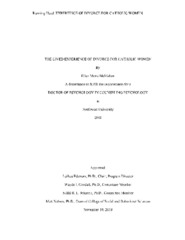The Lived Experience of Divorce for Catholic Women
Abstract
According to Catholic teaching, marriage is permanent and divorce is not an option. The nine Catholic women in this phenomenological study experienced divorce despite their beliefs in the indissolubility of marriage and their efforts to stay married. Grounded in both cognitive and sanctification theories, this research included an exploration of the cognitive, emotional, spiritual, and behavioral experience of divorce related to spiritual trauma, religious coping, and transformational pathways. Two main goals of this study were to gain an understanding of the lived experience of divorce for Catholic women and to explore religious coping strategies, such as, annulment, which is uniquely Catholic. Methods included semi-structured interviews, a questionnaire on frequency of Catholic practices, Brief Religious Coping Scale (Brief RCOPE), and Sacred Loss and Desecration Scale (SLDS). Most of the women in this study experienced spiritual trauma in relation to their divorce. They all engaged in uniquely Catholic religious coping strategies (e.g., confession and Communion), as well as, a variety of others, which demonstrated the complexity and individuality of religious practices even within a well-defined religious group. Some of the women temporarily disengaged from religion after divorce but most turned toward spiritual practices. Some of the women completed an annulment, in which a Church tribunal declared their marriage invalid from the beginning. They found the process to be both difficult and healing. For them, annulment was an instrumental pathway toward acceptance of their civil divorce and hope for the future. However, annulments were underutilized and often misunderstood by the other women in the study. All of the women received counseling at some point either during their marital struggles or after divorce. Some of the women sought counselors who could integrate spirituality in therapy and others did not. The majority of the women reported that spirituality was not addressed in counseling.
Original item type
PDF
Original extent
125 pages
Subject
Collections
Copyright
This original work is protected by copyright. Copyright is retained by the author(s). Works may be viewed, downloaded, or printed, but not reproduced or distributed without author(s) permission.


 Maintained by the Northwest University Library
Maintained by the Northwest University Library